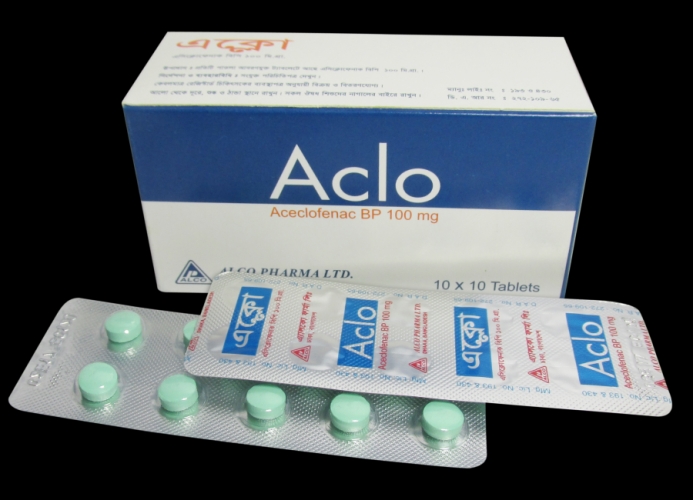ঔষধের বিস্তারিত বা বিকল্প ঔষধ জানতে ঔষধের নাম দিয়ে সার্চ দিন। যেমন- Napa বা Alatrol বা Amodis
Aclo 100mg
TabletAceclofenac
Alco Pharma
Other Strength:
- Alaclov 500mg
- Baclomax 10mg
- Baclodol 10mg
- Aclobet 0.05%
- Aclobet-N (0.5mg+5mg+1LacIU)/gm
Alternative:
- Zolfin 100mg
- Apitac 100mg
- Reservix 100mg
- Flexi® 100mg
- Ternilla 100mg
- Celofen 100mg
- Acecol 100mg
- Painkil 100mg
- Claim 100mg
- Mervan 100mg
- Aceclofen 100mg
- A-Pak 100mg
- Fleco 100mg
- Ceclofen 100mg

Aclo
Description:
Aclo is a non-steroidal agent with anti-inflammatory and analgesic properties. Its mechanism of action is largely based on inhibition of prostaglandin synthesis. Aclo is a potent inhibitor of the enzyme cyclooxygenase, which is involved in the production of prostaglandins.
Composition:
Each tablet contains 100mg Aceclofenac BP.
Indication/Use:
Aclo is indicated in relieving pain and inflammation in osteoarthritis, rheumatoid arthritis and ankylosing spondylitis.
Dosage Guideline:
Adults: The maximum recommended dose is 200mg daily, taken as two separate 100mg doses, one tablet in the morning and one in the evening.
Children: There is no clinical data on the use of Aceclofenac in children.
Elderly: The pharmacokinetics of Aceclofenac are not altered in elderly patients, therefore it is not considered necessary to modify the dose and dose frequency.
Renal insufficiency: There is no evidence that the dosage of Aceclofenac needs to be modified in patients with mild renal impairment.
Hepatic insufficiency: The dose of Aceclofenac should be reduced in patients with hepatic impairment.
An initial daily dose of 100mg should be administered.
Side Effects:
Generally Aceclofenac is well tolerated. The majority of side effects observed have been reversible and of a minor nature and include gastrointestinal disorders (dyspepsia, abdominal pain, nausea and diarrhea) and occasional occurrence of dizziness. Dermatological side effects include pruritus and rash. Abdominal hepatic enzyme levels and raised serum creatinine have occasionally been reported.
Contraindication:
Contraindications: Aceclofenac is contraindicated in patients previously sensitive to Aceclofenac or aspirin or other NSAIDs. It should not be administered to patients with active or suspected peptic ulcer or gastrointestinal bleeding and moderate to severe renal impairment.
Drug Interaction:
Lithium and Digoxin: Aceclofenac, like other NSAIDs, may increase plasma concentrations of lithium and digoxin.
Diuretics: Aceclofenac, like other NSAIDs, may inhibit the activity of diuretics.
Anticoagulants: Like other NSAIDs, Aceclofenac may enhance the activity of anticoagulants.
Quinolones: Convulsion may occur due to an interaction between quinolones and NSAIDs.
Other NSAIDs and steroids: Concomitant therapy with aspirin, other NSAIDs and steroids may increase the frequency of side effects.
Use in Pregnancy & Lactation:
Pregnancy: There is no information on the use of Aceclofenac during pregnancy. Aceclofenac should not be administered during pregnancy, unless there are compelling reasons for doing so. The lowest effective dose should be administered.
Lactation: It is not known whether Aceclofenac is excreted in human milk or not. Therefore, Aceclofenac should not be given to lactating mother unless potential benefits outweigh the risk to the fetus.
Over Dose:
There is no human data available on the consequences of Aceclofenac overdosage. The symptoms could be: nausea, vomiting, stomach pain, dizziness, somnolence and headache.
Treatment: If required, gastric lavage, charcoal in repeated doses. Antacids when necessary and other symptomatic treatment should be given for complications.
Therapeutic Class:
NSAID
Dosage Form:
Tablet
Storage:
Store in a cool dry place, protect from light.
এই পাতাটি ৫৭৮ বার দেখা হয়েছে
রাজডক কী?
ফ্রী সদস্য হোন Click Here
ডাক্তার হিসাবে যোগদান করতে Click Here
নার্স / টেকনোলজিস্ট হিসাবে যোগদান করতে Click Here
ফ্রী সদস্য হোন Click Here
ডাক্তার হিসাবে যোগদান করতে Click Here
নার্স / টেকনোলজিস্ট হিসাবে যোগদান করতে Click Here

